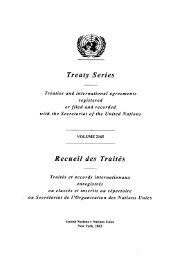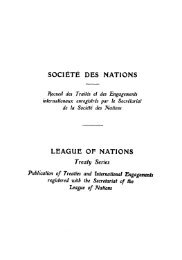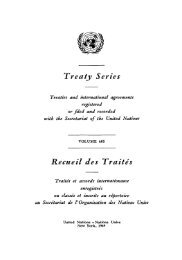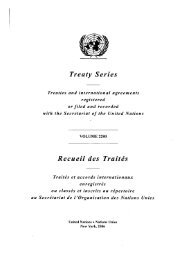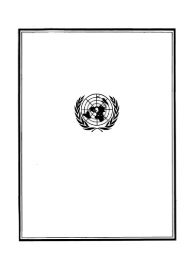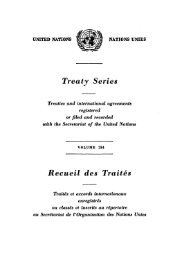- Page 1 and 2:
SOCIIT8 DES NATIONS Recueil des Tra
- Page 3 and 4:
LEAGUE OF NATIONS Treaty Series Pub
- Page 5 and 6:
1931-1932 League of Nations - Treat
- Page 7:
1931-1932 League of Nations - Treat
- Page 10 and 11:
10 Socidt des Nations - Recuel des
- Page 12 and 13:
12 Socite' des Nations - Recuei des
- Page 15 and 16:
N 0 2737. AUTRICHE ET NORVEGE Conve
- Page 17 and 18:
1931 League of Nations - Treaty Ser
- Page 19 and 20:
1931 League of Nations - Treaty Ser
- Page 21 and 22:
1931 League of Nations - Treaty Ser
- Page 23 and 24:
1931 League of Nations - Treaty Ser
- Page 25 and 26:
1931 League of Nations - Treaty Ser
- Page 27 and 28:
1931 League of Nations - Treaty Ser
- Page 29 and 30:
1931 League of Nations - Treaty Ser
- Page 31:
1931 League of Nations - Treaty Ser
- Page 34 and 35:
34 Socidt des Nations - Recuei des
- Page 36 and 37:
36 Socidte' des Nations - Recuei de
- Page 38 and 39:
38 Socie'td des Nations - Recuel de
- Page 40 and 41:
40 Socidt6 des Nations - Recuei des
- Page 42 and 43:
42 Socidte des Nations - Recuei des
- Page 44 and 45:
44 Socit6 des Nations - Recuei des
- Page 47 and 48:
No 2739. ALLEMAGN E, AUTRI CHE, BEL
- Page 49 and 50:
1931-1932 League of Nations - Treat
- Page 51:
1931-1932 League of Nations - Treat
- Page 54 and 55:
54 Socide'td des Nations - Recuei d
- Page 56 and 57:
56 Socidt6 des Nations - Recuei des
- Page 58 and 59:
58 Socidte' des Nations - Recuei de
- Page 60 and 61:
60 Socite' des Nations - Recuei des
- Page 62 and 63:
62 Socidte des Nations - Recuei des
- Page 64 and 65:
64 Socie'te' des Nations - Recuei d
- Page 66 and 67:
66 Socite' des Nations - Recuei des
- Page 69 and 70:
N ° 2741. ESTONIE ET ISLANDE Decla
- Page 71: 1931 League of Nations - Treaty Ser
- Page 74 and 75: 74 Socite' des Nations - Recuei des
- Page 76 and 77: 76 Socidte des Nations - Recuei des
- Page 78 and 79: 78 Socdit des Nations - Recuei des
- Page 80 and 81: 80 Socidte des Nations - Recuei des
- Page 82 and 83: 82 Socijt6 des Nations - Recuei des
- Page 84 and 85: 84 Socie't des Nations - Recueil de
- Page 86 and 87: 86 Socite' des Nations - Recueil de
- Page 88 and 89: 88 Socdte' des Nations - Recueil de
- Page 90 and 91: 90 Socidte des Nations - Recuei des
- Page 92 and 93: 92 Socidte' des Nations - Recuei de
- Page 94 and 95: 94 Socijt6 des Nations - Recuei des
- Page 96 and 97: 96 Socidte des Nations - Recuei des
- Page 98 and 99: 98 Socite' des Nations - Recuei des
- Page 100 and 101: 100 Socit't des Nations - Recuei de
- Page 102 and 103: 102 Soc dte des Nations - Recuei de
- Page 104 and 105: 104 Socidte' des Nations - Recuei d
- Page 106 and 107: 106 Societe des Nations - Recuei de
- Page 108 and 109: 108 Societe des Nations - Recuei de
- Page 110 and 111: 110 Societe des Nations - Recuei de
- Page 112 and 113: 112 Socidte des Nations - Recuei de
- Page 114 and 115: 114 Societ! des Nations - Recuei de
- Page 116 and 117: 116 Socijtd des Nations - Recuei de
- Page 118 and 119: 118 Socidetd des Nations - Recuei d
- Page 120 and 121: 120 Socidt6 des Nations - Recuei de
- Page 124 and 125: 124 Societe des Nations - Recuei de
- Page 126 and 127: 126 Socijti des Nations - Recuei de
- Page 128 and 129: 128 Socidte' des Nations - Recuei d
- Page 130 and 131: 130 Socidtd des Nations - Recued de
- Page 132 and 133: 132 Socijt' des Nations - Recuei de
- Page 134 and 135: 134 Socite' des Nations - Recuei de
- Page 136 and 137: 136 Socijte des Nations - Recuei de
- Page 138 and 139: 138 Socie'te' des Nations - Recuei
- Page 140 and 141: 140 Socie't des Nations - Recuei de
- Page 142 and 143: 142 Socite' des Nations - Recuei de
- Page 144 and 145: 144 Socit des Nations - Recuei des
- Page 146 and 147: 146 Socidte des Nations - Recuel de
- Page 148 and 149: 148 Societ6 des Nations - Recuel de
- Page 150 and 151: 150 Socide'te' des Nations - Recuei
- Page 152 and 153: 152 Socite' des Nations - Recuei de
- Page 154 and 155: 154 Socijte' des Nations - Recuei d
- Page 156 and 157: 156 Socidte des Nations - Recueil d
- Page 158 and 159: 158 Socite' des Nations - Recuei de
- Page 161 and 162: No 2743. BELGIQUE ET FRANCE Accord
- Page 163: 1931 League of Nations - Treaty Ser
- Page 166 and 167: 166 Societd des Nations - Recuei de
- Page 168 and 169: 168 Socite' des Nations - Recuei de
- Page 170 and 171: 170 Socie't! des Nations - Recuei d
- Page 172 and 173:
172 Socijte des Nations - Recuei de
- Page 174 and 175:
174 Socidt des Nations - Recuei des
- Page 176 and 177:
176 Socite des Nations - Recuei des
- Page 178 and 179:
178 Socie'te' des Nations - Recuedi
- Page 180 and 181:
180 Socidte des Nations - Recuei de
- Page 182 and 183:
182 Societe des Nations - Recuei de
- Page 185 and 186:
No 2745. ALLEMAGNE ET ETATS-UNIS D'
- Page 187 and 188:
1931 League of Nations - Treaty Ser
- Page 189 and 190:
1931 League of Nations - Treaty Ser
- Page 191 and 192:
1931 League of Nations - Treaty Ser
- Page 193 and 194:
1931 League of Nations - Treaty Ser
- Page 195 and 196:
1931 League of Nations - Treaty Ser
- Page 197 and 198:
1931 League of Nations - Treaty Ser
- Page 199 and 200:
1931 League of Nations - Treaty Ser
- Page 201 and 202:
No 2746. ALLEMAGNE ET AUTRICHE Trai
- Page 203 and 204:
1931 League of Nations - Treaty Ser
- Page 205 and 206:
1931 League of Nations - Treaty Ser
- Page 207 and 208:
1931 League of Nations - Treaty Ser
- Page 209 and 210:
1931 League of Nations - Treaty Ser
- Page 211 and 212:
1931 League of Nations - Treaty Ser
- Page 213 and 214:
1931 League of Nations - Treaty Ser
- Page 215 and 216:
1931 League of Nations - Treaty Ser
- Page 217 and 218:
1931 League of Nations - Treaty Ser
- Page 219 and 220:
1931 League of Nations - Treaty Ser
- Page 221 and 222:
1931 League of Nations - Treaty Ser
- Page 223 and 224:
1931 League of Nations - Treaty Ser
- Page 225 and 226:
1931 League of Nations - Treaty Ser
- Page 227 and 228:
1931 League of Nations - Treaty Ser
- Page 229 and 230:
1931 League of Nations - Treaty Ser
- Page 231 and 232:
N ° 2747. ALLEMAGNE ET HAITI Trait
- Page 233 and 234:
1931 League of Nations - Treaty Ser
- Page 235 and 236:
1931 League of Nations - Treaty Ser
- Page 237 and 238:
1931 League of Nations - Treaty Ser
- Page 239 and 240:
1931 League of Nations - Treaty Ser
- Page 241 and 242:
1931 League of Nations - Treaty Ser
- Page 243 and 244:
1931 League of Nations - Treaty Ser
- Page 245:
1931 League of Nations - Treaty Ser
- Page 248 and 249:
248 Societe' des Nations - Recuei d
- Page 250 and 251:
250 Socdte' des Nations - Recuei de
- Page 252 and 253:
252 Socitd des Nations - Recuei des
- Page 254 and 255:
254 Sociite des Nations - Recuei de
- Page 256 and 257:
256 Societe des Nations - Recuei de
- Page 258 and 259:
258 Socite' des Nations - Recuei de
- Page 260 and 261:
260 Socite' des Nations - Recuei de
- Page 262 and 263:
262 Societe des Nations - Recuei de
- Page 264 and 265:
264 Socie' des Nations - Recuei des
- Page 266 and 267:
Socidtd des Nations - Recuei des Tr
- Page 268 and 269:
268 Societe' des Nations - Recuei d
- Page 270 and 271:
270 Socidte' des Nations - Recuei d
- Page 272 and 273:
272 Socidt6 des Nations Recuei des
- Page 275 and 276:
No 2751. GRANDE-BRETAGNE ET IRLANDE
- Page 277 and 278:
1931 League of Nations - Treaty Ser
- Page 279 and 280:
1931 League of Nations - Treaty Ser
- Page 281 and 282:
1931 League of Nations - Treaty Ser
- Page 283 and 284:
No 2752. POLOGNE ET ROUMANIE Conven
- Page 285 and 286:
1931 League of Nations - Treaty Ser
- Page 287 and 288:
1931 League of Nations - Treaty Ser
- Page 289 and 290:
1931 League of Nations - Treaty Ser
- Page 291 and 292:
1931 League of Nations - Treaty Ser
- Page 293 and 294:
1931 League of Nations - Treaty Ser
- Page 295 and 296:
1931 League of Nations - Treaty Ser
- Page 297 and 298:
1931 League of Nations - Treaty Ser
- Page 299 and 300:
1931 League of Nations - Treaty Ser
- Page 301 and 302:
1931 League of Nations - Treaty Ser
- Page 303 and 304:
1931 League of Nations - Treaty Ser
- Page 305 and 306:
1931 League of Nations - Treaty Ser
- Page 307 and 308:
1931 League of Nations - Treaty Ser
- Page 309 and 310:
1931 League of Nations - Treaty Ser
- Page 311 and 312:
1931 League of Nations - Treaty Ser
- Page 313 and 314:
1931 League Of Nations - Treaty Ser
- Page 315 and 316:
1931 League of Nations - Treaty Ser
- Page 317 and 318:
1931 League of Nations - Treaty Ser
- Page 319:
1931 League of Nations - Treaty Ser
- Page 322 and 323:
322 Socidte des Nations - Recuei de
- Page 324 and 325:
324 Sociite' des Nations - Recueil
- Page 326 and 327:
326 Socijte' des Nations - Recuei d
- Page 328 and 329:
328 Socidte des Nations - Recuei de
- Page 330 and 331:
330 Socidt6 des Nations - Recuedl d
- Page 333 and 334:
No 2754. POLOGNE ET ROUMANIE Conven
- Page 335 and 336:
1931 League of Nations - Treaty Ser
- Page 337 and 338:
1931 League Of Nations - Treaty Ser
- Page 339 and 340:
1931 League of Nations - Treaty Ser
- Page 341 and 342:
1931 League of Nations - Treaty Ser
- Page 343 and 344:
1931 League of Nations - Treaty Ser
- Page 345 and 346:
1931 League of Nations - Treaty Ser
- Page 347 and 348:
1931 League of Nations - Treaty Ser
- Page 349 and 350:
1931 League of Nations - Treaty Ser
- Page 351:
1931 League of Nations - Treaty Ser
- Page 354 and 355:
354 Socie'te des Nations - Recuei d
- Page 356 and 357:
356 Socite' des Nations - Recuel de
- Page 358 and 359:
358 Societ6 des Nations - Recuei de
- Page 360 and 361:
360 Socitd des Nations - Recuei des
- Page 362 and 363:
362 Socidte des Nations - Recuei de
- Page 364 and 365:
364 Socijt6 des Nations - Recuei de
- Page 366 and 367:
366 Socitd des Nations - Recuei des
- Page 368 and 369:
368 Sociitd des Nations - Recuei de
- Page 371 and 372:
No 2756. BELGIQUE ET ESTONIE Echang
- Page 373 and 374:
1931 League of Nations - Treaty Ser
- Page 375:
1931 League of Nations - Treaty Ser
- Page 378 and 379:
378 Socidt6 des Nations - Recuedi d
- Page 380 and 381:
380 Socie'td des Nations - Recuei d
- Page 382 and 383:
382 Socie'td des Nations - Recuei d
- Page 385 and 386:
No 2758. POLOGNE ET TCHEICOSLOVAQUI
- Page 387 and 388:
1931 League of Nations - Treaty Ser
- Page 389 and 390:
1931 League of Nations - Treaty Ser
- Page 391 and 392:
1931 League of Nations - Treaty Ser
- Page 393 and 394:
1931 League of Nations - Treaty Ser
- Page 395 and 396:
1931 League of Nations - Treaty Ser
- Page 397 and 398:
1931 League of Nations - Treaty Ser
- Page 399 and 400:
1931 League of Nations - Treaty Ser
- Page 401:
1931 League of Nations - Treaty Ser
- Page 404 and 405:
404 Socidte des Nations - Recuei de
- Page 406 and 407:
406 Socidte' des Nations - Recuei d



